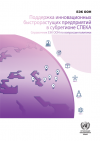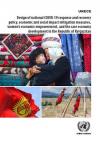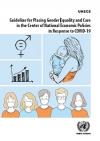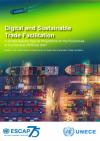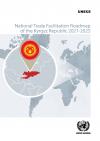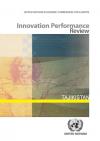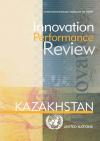Publications
Displaying Results 1 - 17 of 17
- English
Innovation – or the systematic experimentation with new ideas – is essential for the sustained economic growth and enhanced competitiveness of the seven countries of the United Nations Special Programme for the Economies of Central Asia (SPECA), i.e., Afghanistan, Azerbaijan, Kazakhstan, Kyrgyzstan, Tajikistan, Turkmenistan and Uzbekistan, to achieve sustainable development in line with the UN
- English
The UNECE region, including the participating countries of the United Nations Special Programme for the Economies of Central Asia (SPECA), have recently faced a number of challenges, such as the COVID-19 pandemic and resulting economic downturn, the impact of military conflict in Ukraine, and the triple planetary crisis of climate change, biodiversity loss and pollution. This has negatively
- Pусский
Регион ЕЭК ООН, включая государства-участники Специальной программы Организации Объединенных Наций для экономики стран Центральной Азии (СПЕКА), в последнее время сталкивается с рядом проблем, включая пандемию COVID-19 и последовавший за ней экономический спад, последствия военных действий на Украине, а также тройной планетарный кризис - изменение климата, потеря биоразнообразия и загрязнение
- English
Fourth cycle of EPRs: advancing environmental performance in the region and beyond. Transforming Planet.
This calendar promotes the fourth cycle of UNECE EPRs, based on the document adopted by the Committee on Environmental Policy and subsequent decisions made, as well as ministerial decisions.
Three EPR cycles have already taken place. Printed copies of EPR publications may be
- English
- English
This report contributes to the development of COVID-19 recovery efforts and economic and social strategy and priority actions in the Republic of Kyrgyzstan, based on the gender-sensitive approach and the strengthening of the care economy strategies in the post-pandemic recovery period. It represents an overview of the main policy areas of the development and implementation of public post-
- English
To support national efforts toward developing and implementing care-responsive and gender-transformative response and recovery policies, the UN Economic Commission for Europe (ECE) has engaged in a global project with UN regional commissions and cooperating partners. The toolkit “Placing Gender Equality and Care in the Center of National Economic Policies in Response to COVID-19” has been
- English
The report presents results of the 2021 United Nations Global Survey on Digital and Sustainable Trade Facilitation for six participants in United Nations Special Programme for the Economies of Central Asia (SPECA), namely Afghanistan, Azerbaijan, Kazakhstan, Kyrgyzstan, Tajikistan and Uzbekistan, reviewing the progress of trade facilitation reforms and provides a detailed analysis based on 58
- Pусский
Являясь инструментом инновационной политики, бизнес-инкубаторы (БИ) обладают большим потенциалом для стимулирования инновационного предпринимательства за счет предоставления стимулов, обеспечения поддержки, налаживания связей и создания благоприятных условий для людей, которые хотят разрабатывать и опробовать новые идеи. Экспериментирование с идеями в целях создания стоимости и более
- English
This handbook covers the key steps and considerations to set up, run, and evaluate business incubation programmes. Section 1 outlines the defining characteristics of BIs and their effectiveness in transition economies. Section 2 describes the stages of business incubator creation, namely: BI feasibility assessments based on environmental factors; setting the goals that determine the type or model
- English
This study summarizes the key findings of the ninth study, which focuses on Serbia. It was carried out pursuant to the Government’s request to support ongoing efforts to increase the trade sector’s contribution to development and the implementation of the 2030 sustainable development goals (SDGs). The study was prepared by the UNECE secretariat in close consultation with public and private-sector
- English
The National Trade Facilitation Roadmap of the Kyrgyz Republic 2021-2025 serves as the guiding framework for comprehensive national trade facilitation reforms over a five-year period. The Roadmap sets out a strategic vision and respective goals and activities for the Kyrgyz Republic to implement. Through these activities the Kyrgyz Republic can transform its trade facilitation services to
- English
Innovation is central to the United Nations 2030 Agenda for Sustainable Development and to economic development across the world. One of the most open and democratic countries in the region, with a strategic location, educated work force, strong legacy of applied research, competitive wage levels, ample natural resources, and vibrant and growing links with the neighbouring region,
- English
Innovation has never been higher on the economic policy agenda, and features prominently in the United Nations 2030 Agenda for Sustainable Development. The Republic of Tajikistan has achieved strong economic and social development over recent years, and has made important steps in moving away from a factor-driven to an efficiency-driven model of growth. Innovation will be crucial to
- English
The Innovation Performance Review of Kazakhstan continues the series of national assessments of innovation policies initiated by the pilot Innovation Performance Review of Belarus. These policy advisory exercises draw on the experience accumulated by the UNECE in the identification of good practices and policy lessons in the area of knowledge-based development,
- English
The development of information and communications technologies (ICTs) gives rise to a variety of legal and regulatory issues for policymakers, from the validity of electronic methods of contracting and the security risks associated with them, to concerns over cybercrime and the ability to protect intellectual property rights online. This guide has been intended for use as a reference manual by
Download this publication in RussianPDF (0.9 MB)



